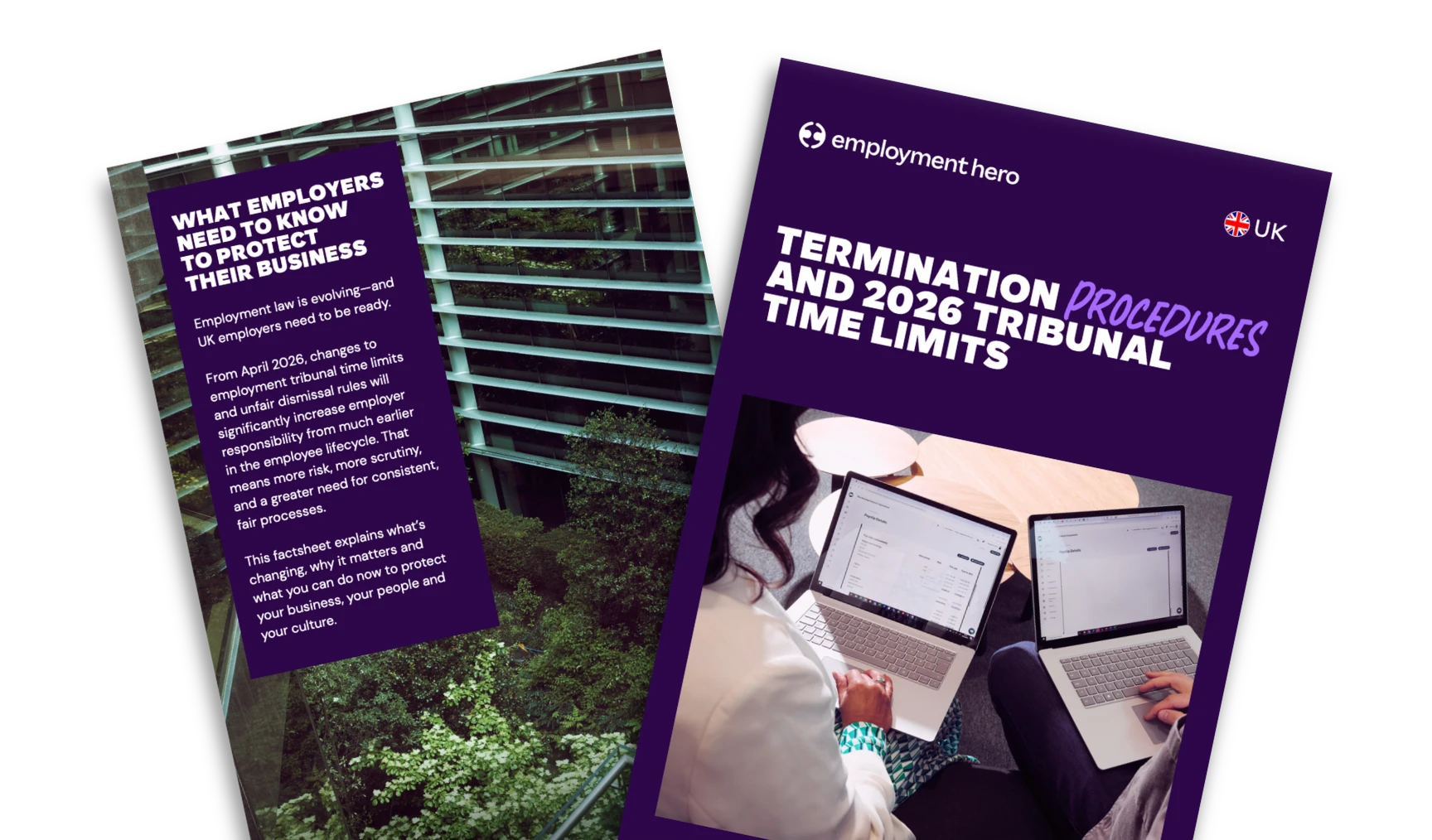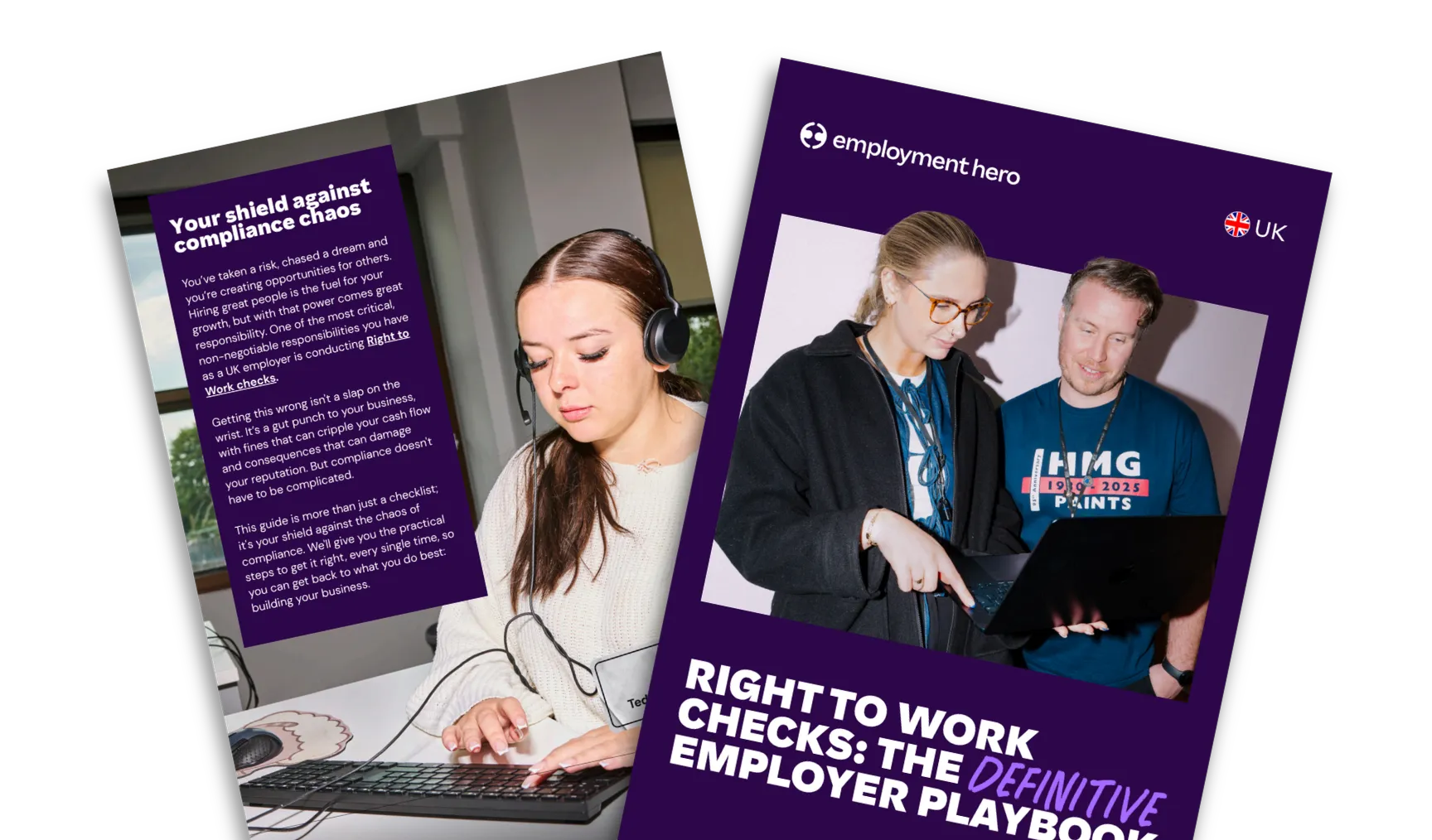Independent contractor agreement checklist: Learn what to include
Published
Independent contractor agreement checklist: Learn what to include
Published
Thinking of bringing on an independent contractor? Before you do, it’s important to get the details written down in a formal agreement. An independent contractor agreement sets out how you’ll work together, such as the responsibilities, payment terms, and who owns the finished work. If set up properly, it can minimise the room for confusion or disagreement later.
Skip it, and you’re taking a gamble. Disputes over invoices, uncertainty about deadlines, or even unexpected tax issues with HMRC can crop up if nothing is clearly agreed upfront. These are the kinds of problems that cost far more time and money to fix once they’ve already happened.
If you’re unsure where to start, you’re not alone. Confusion around contractual obligations are common, which is why we’ve put together a straightforward checklist covering the key points. And if you need more tailored HR support, our team is here to help.
The information in this article is current as at 1 October 2025, and has been prepared by Employment Hero UK Ltd and its related bodies corporate (Employment Hero). The views expressed in this article are general information only, are provided in good faith to assist employers and their employees, and should not be relied on as professional advice. Some information is based on data supplied by third parties. While such data is believed to be accurate, it has not been independently verified and no warranties are given that it is complete, accurate, up to date or fit for the purpose for which it is required. Employment Hero does not accept responsibility for any inaccuracy in such data and is not liable for any loss or damages arising directly or indirectly as a result of reliance on, use of or inability to use any information provided in this article. You should undertake your own research and seek professional advice before making any decisions or relying on the information in this article.
What is an independent contractor agreement?
An independent contractor agreement is a legal contract between a business and someone providing services on a self-employed basis. In the UK, its role is to formalise the relationship and outline exactly what is expected on both sides.
Essentially, it communicates who does what, how much the contractor will be paid, who owns the work, and what happens if things don’t go to plan. Unlike employee contracts, it does not create an employment relationship. That means the contractor is responsible for their own tax, national insurance, and running costs.
It’s also more detailed than a casual freelancer agreement. While freelancers may work project-to-project with minimal paperwork, independent contractor agreements tend to go deeper into liability, compliance, and intellectual property.
Why independent contractor agreements matter in the UK
UK law, especially around IR35, puts the responsibility on the employer to prove the working relationship is genuinely that of an independent contractor. If you don’t set this out clearly in writing, you could find yourself faced with unexpected tax bills or getting caught up in legal disputes.
For example, imagine you take on a contractor to deliver IT services for your business. You skip the agreement. Six months in, HMRC reviews the arrangement and decides the contractor looks more like an employee under IR35. You could be facing tax liabilities and national insurance contributions you never budgeted for. A written agreement could prevent that.
Having an independent contractor agreement:
- Protects both sides if there is a disagreement.
- Shows HMRC you have taken steps to comply with IR35 rules.
- Helps prevent “sham” contracting, where someone is treated like an employee without proper rights.
- Keep tax responsibilities clearly defined so you are not on the hook for someone else’s liabilities.
What to include in an independent contractor agreement
Every business is different, so there is no one-size-fits-all template for contractor agreements. The right contract depends on the work, the project length and the relationship you are setting up. But there are some common elements you will almost always want to cover.
We have pulled them together in our independent contractor agreement checklist, which you can download for a detailed overview of each requirement.
Here is an overview of some of the elements that usually need to be included:
Contractor and business details
Start with the basics. Every agreement should clearly identify both parties:
- Full legal names and addresses.
- Companies House registration numbers, if relevant.
- A declaration that the person is working as an independent contractor, not as an employee.
This avoids confusion later on about status or accountability. The checklist includes an outline of what details HMRC would expect to see if your contract was ever reviewed.
Scope of work and deliverables
Next, outline exactly what the contractor is being hired to do. This should include:
- A clear description of the services.
- Any timelines, milestones, and performance expectations.
The more specific you are here, the less chance there is for misunderstandings about what “finished” really looks like.
Payment terms
The agreed payment terms should be as transparent as possible. Ensure you include:
- How fees will be structured (hourly, daily, fixed, or project-based).
- Payment intervals, invoicing requirements, and how late payments will be handled.
Duration and termination
Contracts should never feel open-ended unless that is intentional. Include:
- Whether the work is for a fixed term or an ongoing arrangement.
- Notice periods, termination rights, and dispute resolution processes.
This way, both parties know how to exit gracefully if things change.
IP ownership and moral rights
In creative or technical projects, who owns the finished product is an important clarification. Your agreement should make clear:
- Whether intellectual property transfers to the business once it is completed.
- Any licensing arrangements, or if the contractor retains rights.
Leaving this vague can lead to serious disputes later on. A common scenario is when a contractor produces software or marketing material and then reuses it for other clients. If you need exclusivity, make sure it is written into the agreement.
Confidentiality and data protection
Businesses will want contractors to handle information carefully. Include:
- Confidentiality obligations through NDAs or specific clauses.
- Data handling requirements, particularly around GDPR if personal data is involved.
Our checklist goes into more detail on what GDPR obligations might apply to contractors.
Insurance and liability
Contractors usually carry their own insurance, but it is worth stating what is expected. Typical cover includes:
- Public liability insurance.
- Professional indemnity insurance.
- Acknowledgement that the contractor is responsible for mistakes or negligence.
This protects both your business and the contractor if things go wrong.
Legal compliance and tax status
Finally, the compliance side. Good agreements will:
- Reference IR35 and clarify that the contractor is responsible for their own tax.
- State clearly that income tax and NI are the contractor’s responsibility.
- Optionally, point to HMRC’s Employment Status for Tax tool for further checks.
You will find a more detailed breakdown of compliance requirements in our checklist.
Independent contractor vs employee: key differences
It is not always obvious where the line between “employee” and “contractor” falls. HMRC will look at a few factors to decide.
The key tests are:
- Control: does the business direct how, when, and where the work is done?
- Substitution: can the contractor send someone else in their place?
- Mutuality of obligation: is the business obliged to provide work, and is the contractor obliged to accept it?
Here is how it breaks down:
| Factor | Employee | Independent contractor |
|---|---|---|
| Control over work | Employer decides how, when, and where work is done | Contractor decides how to deliver services |
| Substitution allowed | No, must do the work personally | Yes, can appoint a substitute |
| Tax responsibilities | Employer deducts PAYE and NI | Contractor pays their own tax |
| Benefits and entitlements | Holiday pay, sick pay, pensions | None, self-managed |
| Tools and materials provided | Employer | Contractor supplies their own |
Common mistakes to avoid
Contractor agreements can go wrong if they are rushed or borrowed from the wrong source. Some of the most common mistakes we see include:
- Unclear definitions, which leave too much room for disputes.
- Forgetting to include clauses on IR35 or tax responsibilities.
- Copy-pasting a template without legal review.
- Overlooking confidentiality or GDPR obligations.
Imagine investing months into a contractor relationship only to find out the agreement you used was copied from an overseas template and does not meet UK legal standards. That oversight could expose you to penalties and claims. Avoiding these mistakes saves time and money in the long run.
Looking for an independent contractor agreement? You can speak to one of our HR advisors to get tailored contracts for your business.
Tips for drafting a strong contractor agreement
So how do you make sure your contractor agreements hold up?
- Work with legal counsel or HR experts who know UK employment law.
- Tailor each agreement to the specific project, rather than using a one-size-fits-all template.
- Review and update agreements regularly as laws and HMRC guidance evolve.
- Keep signed agreements stored securely, so they are easy to find if you ever need them.
When it comes to your contracts and records, it shouldn’t be “set and forget”. If there is a legal update in your industry, you’ll want to review your contracts to ensure they still cover your obligations.
Get expert help with contractor agreements
Keeping up with employment laws and obligations can be challenging, especially when you’re trying to balance day-to-day business needs at the same time. With rules and expectations constantly shifting, it’s easy to feel uncertain about the best way forward.
That’s where Employment Hero comes in. With our Employment OS, we bring together the advice, tools and resources you need to manage your people. Our HR Advisory team is here to help you make sense of complex requirements and provide practical guidance tailored to your situation.
Whether you’re engaging a contractor for the first time, juggling a mix of freelancers, or managing a growing workforce, our experts can support you at every stage.
FAQs on independent contractor agreements
Yes. Contractors are expected to carry their own insurance to protect against professional mistakes or accidents.
It depends on the work, but common policies include public liability insurance, professional indemnity insurance, and sometimes employer liability insurance if they hire staff.
Most contractors must register for self-assessment with HMRC. If their turnover passes the VAT threshold, they will also need to register for VAT.
No. Contractors are not entitled to employee benefits like paid holidays, sick pay, or pensions.
Contractors typically provide their own tools and equipment, which helps reinforce their independent status.
Yes. Independent contractors are free to take on work from several clients, unless a contract specifically limits this.
IR35 is used to assess whether someone is genuinely self-employed or effectively an employee for tax purposes. Contractor agreements should be written in a way that reflects genuine independence and supports the actual working practices.
You can, but they need to be reasonable in scope and length. Courts may not enforce overly restrictive clauses.
Most agreements will include a dispute resolution clause, usually requiring negotiation or mediation before legal action.
Yes. While checklists and guides (like ours) are a good start, legal advice ensures your contract is compliant and tailored to your situation.
Register for the downloadable
Related Resources
-
 Read more: Termination Procedures and Tribunal Time Limits: What the 2026 Rule Changes Mean for Employers
Read more: Termination Procedures and Tribunal Time Limits: What the 2026 Rule Changes Mean for EmployersTermination Procedures and Tribunal Time Limits: What the 2026 Rule Changes Mean for Employers
Learn how the 2026 changes to the employment tribunal time limit impact termination procedures. Protect your business with compliant processes…
-
 Read more: Right to Work Checks: A Complete Employer’s Guide (2025 Update)
Read more: Right to Work Checks: A Complete Employer’s Guide (2025 Update)Right to Work Checks: A Complete Employer’s Guide (2025 Update)
Ensure compliance with UK right to work checks. Discover how to complete manual, digital, and online checks correctly and meet…
-
 Read more: A Business Owners 2026 HR Compliance Calendar: Stay Confident, Stay Compliant
Read more: A Business Owners 2026 HR Compliance Calendar: Stay Confident, Stay CompliantA Business Owners 2026 HR Compliance Calendar: Stay Confident, Stay Compliant
Stay ahead in 2026 with our HR Compliance Calendar. Key deadlines, legal updates and compliance tips to keep your business…



















